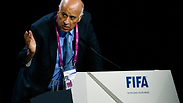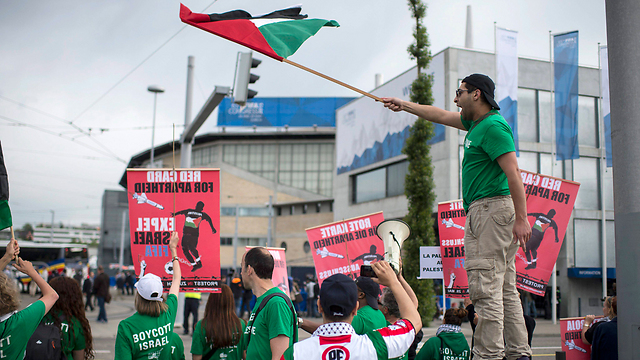
Rajoub can be deterred, but what about the rest of the world?
Op-ed: When it comes to boycott threats, Israel's problem is not the Palestinians, but many of Israel's friends in the West. From one vote to another, it is becoming increasingly difficult for them – both morally and politically – to defend the Israeli policy in the West Bank.
And then deputy Shin Bet chief Israel Hasson arrived. He lay down next to Husseini. We journalists stood outside, around the tent, waiting for news. Several minutes later, Hasson appeared, and walked away without saying a word. Husseini kept quiet too, but the aura of courage around his strike had faded. Shortly afterwards, he folded the tent and went home.
I have no idea who convinced Jibril Rajoub to relax his stance during the FIFA conference in Zurich, whether it was the eternal chairman, Sepp Blatter, who was fighting for his seat, whether it was the Qatari representatives, who bought the hosting of the World Cup and was afraid that his investment would go down the drain, or whether it was Deputy Foreign Minister Tzipi Hotovely's brilliant moves or Israeli FA Chairman Ofer Eini's heartbreaking smile. I would bet on a different possibility: Someone reminded Rajoub where he came from and where he is headed. Or he just remembered it on his own.
Rajoub's great days were during his term as head of the Palestinian security apparatus in the West Bank. If Yasser Arafat was the king of the West Bank, Rajoub was the crown prince. Shin Bet officials lauded him. They remembered his war on Hamas after the wave of terror attacks in 1996. At Rajoub's order, and some say with his personal execution, Hamas members were shot on the hills of Beitunia, southwest of Ramallah, the same hills on which Rajoub built his security apparatus' headquarters.
What is all this splendor for, Abu Rami, I asked him once. And he replied, in his hoarse Hebrew: "When they see us like this, they respect us. This way, we are strong."

During Operation Defensive Shield in April 2002, Rajoub refused to turn in Hamasniks who received shelter in his compound. It was the order he got from Arafat. After a four-day siege, the IDF destroyed the building by firing from attack helicopters and tanks. The villa in which Rajoub lived, in northern Ramallah, was fired on from the division's camp in Beit El. The division commander was former IDF chief Benny Gantz.
Later that week, I met with Rajoub in Ramallah. He spoke like a person whose entire world had fallen apart. "You tell me," he protested, "why they did this to me." His assistant, Abu Osama, gave me a tour of the compound. What hadn't been burned had been smashed, including Rajoub's huge picture in his fancy bureau on the third floor.
"You can destroy a building," Rajoub said." You can't kill the drive for freedom." March was an intolerable month, I told him. No government could have sat idly by. "I understand, I understand," he said. "But the future will be worse."
Several years later, Rajoub restored his career, as head of the Palestinian sports organizations. He spotted the economic, diplomatic, political and maybe even sportive potential. Israel has not been discriminating against his players. It has been treating them just like it treats other Palestinians living under an occupation – and that's precisely the problem.
All sides in this story are playing make believe. FIFA believes that Palestine is a state. It deserves to develop leagues and tournaments, with the finest players and masses of fans, who will arrive at the stadiums freely. It deserves to nurture and train a national team. The occupation has different rules, but FIFA isn’t built to recognize the rules of the occupation.
The settlers' lobbies are also playing make believe. They believe that the same law applies to Elon Moreh and to Be'er Sheva, that the same law applies to the factories in Barkan and to the factories in Tefen, and that the same law applies to Beitar Ariel and to Beitar Tel Aviv. Israel's governments have been conducting themselves according to this dictation for years; the international community refuses to.
So the joy which filled our government ministers is at best premature. Prime Minister Benjamin Netanyahu is right when he says that the Palestinians are not only challenging the occupation, but Israel's actual existence. Yet our problem in this issue is not the Palestinians, but a large part of Israel's friends in the West. From one junction to another, from one vote to another, it is becoming increasingly difficult for them – both morally and politically – to defend the Israeli policy in the West Bank.
Rajoub can be deterred. There are ways to do that. But as long as we have not occupied the rest of the world, we have a problem.










